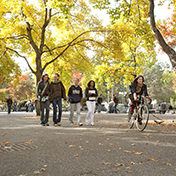Palliative care could alleviate harms of homelessness

A three-year University of Victoria study of people living homeless or barely housed while struggling with life-threatening medical conditions confirms that when palliative care can be found, it improves the difficult life circumstances and worsening vulnerabilities people face as their health fails.
Researchers spent more than 300 hours with 25 homeless or barely housed people in Victoria over a two-year period, or until they died. They attended trips to medical appointments, made observations of interactions between health and social care workers, and conducted almost 150 interviews with the 25 people, their friends, partners, people they identified as chosen family, and service providers.
The resulting report, Too little, too late: How we fail vulnerable Canadians as they die and what to do about it, identified worsening vulnerabilities for people with a diagnosis of life-limiting conditions such as cancer, heart failure and lung disease, but improved quality of life for those able to access palliative care–the end-of-life health services that include pain management, increased supports, and help for caregivers.
Palliative care not only prevents and eases suffering, but alleviates the harms of homelessness through whole-person care addressing the basic needs lacking for this population, says study lead Kelli Stajduhar, lead investigator with UVic’s Institute on Aging and Lifelong Health and School of Nursing. The research team was struck by how just being a participant in the study brought improvements in people’s quality of life by making it possible for them to get a palliative diagnosis, regular follow-up and care.
The study confirmed that people experience the same injustices while dying as they commonly face in their daily lives: stigmatization, criminalization, racialization and exclusion.
Yet those who were able to access palliative care saw their quality of life improve, along with their access to resources such as food, shelter and social supports. That significantly improved their end-of-life experiences. “Being labelled ‘palliative’ opened people up to a basket of services and resources previously unavailable to them,” notes Stajduhar.
Research team member Grey Showler, director of health and support services with Victoria Cool Aid Society, says those in the study who got access to palliative approaches such as good pain management, coordinated care, support for their chosen caregivers and grief and bereavement support “had experiences at end-of-life that not only prevented pain and suffering, but mitigated the harms of homelessness.”
People dealing with homelessness and life-threatening conditions typically don’t get diagnosed until late in their illness, adds Showler, both due to “survival priorities” and to poor treatment within the health care system. Treatment options are reduced because of that.
He says people experiencing homelessness face many barriers to accessing care, including policies that can prevent health care workers from entering sites where people are living and a lack of support for friends who are caring for them.
The study confirms that developing an orientation to palliative care that is built into and bridges existing programs could make a major difference in how Canadians with multiple barriers to good health and safe housing live and die.
A press kit containing a high-resolution photo is available on Dropbox
-- 30 --
Photos
Media contacts
Kelli Stajduhar (Institute on Aging & Lifelong Health & School of Nursing) at 250-721-7487 or kis@uvic.ca
Grey Showler (Director, Health and Support Services, Victoria Cool Aid Society) at 250-385-1466 or gshowler@coolaid.org
Suzanne Ahearne (University Communications + Marketing) at 250-721-6139 or sahearne@uvic.ca
In this story
Keywords: health, homelessness, drugs, community
People: Kelli Stajduhar, Ashley Mollison





